- Home
- Marilyn French
A Season in Hell Page 2
A Season in Hell Read online
Page 2
Barbara’s husband, Harold, is a surgeon, and over the decades of her marriage she has picked up considerable medical knowledge. So as we relaxed over drinks at her house, I asked her to feel the lumps and tell me what she thought. She did; she frowned and said, “Show them to Harold tonight.” Harold came in as we were about to go out to dinner, and I repeated my request. He felt them, frowned, also said, “Show them to your doctor.” The concern and dismay they tried to hide reinforced my sense that the lumps were cancer.
As soon as I returned to New York, I made an appointment with the ENT physician I had seen before. He ordered a CT scan. As I was leaving his office, he said, “I am very sorry for you, Ms. French.” I deduced he didn’t need a CT scan to know cancer when he felt it. The scan, taken on Thursday, June 11, showed a growth on my esophagus. I was given the results on Friday.
Sick at heart, I flew to Dublin on Sunday, to give the keynote address at the Joyce Symposium. I love Ireland, and I’ve walked through Dublin often, on Bloomsdays and other visits; and this was to be a special visit—President Mary Robinson was to introduce me. But after giving my speech and attending the Bloomsday Banquet (at Trinity this year, rather than Dublin Castle), I left. I did not stay to enjoy the city or the rest of the symposium, as I usually do. I was too anxious and frightened, and I needed to make plans for treatment.
The day after I returned, I went to St. Luke’s–Roosevelt for a biopsy conducted by the ENT specialist. He called even before the sample had been biopsied. There was no question in his mind: the mass in my esophagus was malignant. He wanted to operate, to get rid of it as soon as possible; how about Monday? The idea that he could rid me of this cancer that easily and quickly very much appealed to me, and I agreed. But I also called Edie Langner, who said that was rushing things. Wait, she advised. Consult other doctors. I’ll get some names for you.
On Friday, the next day, I was supposed to fly to Stratford, Ontario, to give a talk at the Shakespeare Theatre Festival, but the biopsy had left my throat too sore for speech. I realized this on Thursday afternoon, a little late to find a replacement. I felt terrible at letting the Stratford people down, especially at the last minute, and searched my mind. Then it came to me: Gloria! It didn’t matter that she wasn’t a Shakespeare scholar; everyone would love meeting the most famous feminist in the world, who is also a graceful, intelligent speaker and a lovely person. If she was free, if she was willing, she could give the speech I’d written—if she wanted to use it. She might even enjoy it: I had analyzed Measure for Measure with special attention to its several endings, in which two wronged women clamor for justice. Both have been harmed by Antonio, the surrogate for the true ruler, the Duke, who has been away. The women charge Antonio with what we would call sexual harassment and rape. But what is astonishing is that the arguments Antonio and the Duke (acting as male authority) use to silence and dismiss the women are exactly the same as those used by the men of the Senate committee against Anita Hill during the Clarence Thomas hearings.
I called Gloria, who said she was pleased to do this, especially since I had never before asked her for anything. Not a word about her rare free weekend sacrificed, or the fact that she would have to leave for Canada the very next day. She went and was, of course, a sensation; the Stratford audience and officials were delighted. On top of that, she donated the entire honorarium to a cause she supports. This is one example of why so many people consider her a saint.
The biopsy showed I had squamous cell cancer, a slow-growing type that grows in organ linings. I later discovered that the mass the ENT man found was not the primary cancer but a metastasis. Edie had saved me from a terrible error. If the ENT specialist had operated on the tumor he found, he would not have removed the entire cancer and might have damaged my voice box, since the cancer was touching the nerve leading to the vocal cord. I never returned to that doctor.
The soreness in my throat faded in two days, and on Monday I went ahead with my plans to fly to Amsterdam for the 1992 Feminist Book Fair, where I was to speak. I enjoyed the week at the fair as much as I could enjoy anything in that time. I met Marleen Gorris (who in 1996 would win an Academy Award for Antonia’s Line but who had already made the deeply impressive A Question of Silence, which many people believe to be the greatest feminist film ever made). I went through the motions of debating Fay Weldon (a dear woman with whom I have no significant differences). With my friends Annaville Petterson and Nettie Blanken, I walked out to Marken lighthouse, a beautiful spot on Lake Ysselmeer, the former Zuyder Zee. It was too long a walk for me, and I was grateful when we stopped for beer and sandwiches on the way back.
I was moving about in a kind of stupor, wondering if this was the last time I would see this friend or that, the last time I would visit this lovely city, the last time I would be an apparently healthy person in public. And indeed, that was the case.
1992
JULY
THE DAY AFTER MY return from Amsterdam, I had another CT scan and began visiting oncologists. Edie recommended a lung specialist at Sloan-Kettering, an oncologist at Columbia Presbyterian, and a female oncologist in private practice. My children accompanied me, to help me decide among them. The Sloan-Kettering doctor told me the mass that had been detected was not the primary cancer and that it was necessary to discover the primary site before treatment could proceed. He suspected it was in the lung, but he could not find it on my chest X-rays or CT scan.
All of these doctors treated me like a responsible, intelligent person. None of them was able to spot the primary site of the cancer on my X-rays, which I now carried with me (Sloan-Kettering had lost my first set). Still, they made very different impressions on me. The Columbia oncologist, an extremely likable man, seemed so eager to make me better that he felt sure he could do so rather easily. He shrugged off the problem of the primary site too cheerfully to arouse my confidence. The oncologist in private practice could not get past her annoyance at our lateness (Jamie and I had been stuck in traffic for half an hour). She showed no interest in my case, or in how to find the primary site, and was completely pessimistic about my chances of survival. The S-K lung specialist, Elliot Strong, was kind and met my eyes when either of us spoke. Beyond that, he would do something that made me trust and respect him deeply.
During the weeks when I visited doctors, I was rarely alone. Someone or several people—one or more of my children, Charlotte Sheedy, Esther Broner, Gloria Steinem, LeAnne Schreiber, Barbara Greenberg—went with me to all my doctors’ appointments, CT scans, the biopsy; one or two came to have dinner with me every night. On July 2, the coven held a meeting, our usual solstice meeting, delayed because of my trip to Holland. It felt, however, like an emergency meeting dedicated to me.
At coven meetings we gather gradually, chat over drinks, then have a formal dinner. Candles are spread around the meeting place; the lights are low. After dinner we move to soft chairs, and then someone begins. She will describe a problem with which she needs help—finding direction toward some goal, or a personal transformation she wishes for but is not achieving. We listen intently; we try to rephrase what is said, to be sure we understand what is wanted, needed. Then we discuss the qualities necessary to reach the desired end. After that comes the magical part of the evening, as we surround the seeker and call down upon her head whatever she needs of spirit, courage, and clarity to accomplish her desire. I say this is magical because it feels enchanted: the wisher feels enveloped by goodwill and love; the givers feel empowered by a wave of largesse and love. And in truth, we have had some success in helping each other to fulfill desires and overcome difficulties.
This evening, my friends surrounded me with their bodies and spirits as if they were electrically charged. They changed the very air, calling on all benevolent energies and spirits to surround me, heal me.
The next day, my son, Rob, drove me to my country house. My head was not functioning properly; I felt so dazed that I feared I would have an accident if I tried to drive. The children—Jam
ie, Rob, and Barbara—had planned a large party that weekend. They called it a going-to-the-hospital Fourth of July party; I called it a farewell party. A host of my friends and my children’s friends attended; the kids did the planning, shopping, cooking, and cleaning up. Many people stayed overnight, and at its end I felt surrounded by love and good wishes, deeply cared about, unusual for me.
Another week went by, and nothing happened. Edie calmly insisted that no one knew anything definite about cancer and no one could predict my future. She refused to assume either that I was doomed or that I would recover. But I was anxious: time was passing, the cancer was growing, and no one was doing anything. I believed that no one would act unless I did (shades of my childhood sense of total responsibility for our family!), that the doctors were unsure and therefore paralyzed. So I telephoned Dr. Strong, who had most impressed me medically and humanly, saying I was concerned about the delay and wanted some action on my case. He told me to come in and see him. Charlotte went with me.
What makes a doctor wonderful, beyond medical competence, is one simple characteristic: understanding of suffering, personal comprehension of pain. One would think that anyone over thirty must know pain, but in fact, men in our society are encouraged to deny pain and suffering, and medical schools tend to encourage such denial. As a result, many doctors, women as well as men, become brittle and closed off. Of course, they suffer—that is inevitable—but they don’t let themselves feel their suffering, so derive no knowledge from it and cannot use it. And what we deny ourselves, we deny others.
There are no special phrases or gestures needed to communicate an understanding of pain (notwithstanding our President’s familiar “I feel your pain”). Those who have it convey an implicit largeness of spirit and a depth of feeling in utterance and gesture. For example, a Mount Sinai nephrologist who attended me in 1995–96 would visit my hospital bed early in the morning—as most doctors do. I do not rise early and was always asleep when he arrived, around 8:00 a.m. But instead of calling out sharply, “Ms. French!” and startling me awake, as most doctors did, he would stand silently by the side of the bed and lay his hand gently on my forehead. This would always wake me in the sweetest possible mood (a miraculous thing to induce in me in the morning!). I loved him for this gesture.
Dr. Strong was a man who understood pain. He reexamined the CT scan and shook his head again. He repeated that no one had been able to spot it, even using a magnifying glass. Then he said, “Ms. French, you know where the primary site is. You do. Think about it, and call me.”
I did think about it, and after a time, I recalled sitting on my porch in the Berkshires the summer before, eating a sandwich made of a good Jewish rye bread with a crisp crust, and as I swallowed, the bread suddenly stuck in my throat. It felt as if it was passing over a swelling. At the time, my heart stopped and I thought: Oh, God! What is that? But I pushed the question away. It was nothing. If it was anything, it would make itself known in time, I told myself.
Now it had.
I called Dr. Strong and told him that the primary site was about two inches below my clavicle. He said he would pore over the X-rays millimeter by millimeter with a magnifying glass. A few days later, he called, saying he had found a slight thickening exactly where I had said it would be.
Rob and my old Harvard friend LeAnne Schreiber went with me the next time. We had to wait four hours. Dr. Strong said he needed to perform a laryngoscopy and an endoscopic ultrasound to verify the location. I must have been distressed and shown it, because he insisted I wait and see Dr. McCormack, who would perform the endoscopy. Perhaps he thought seeing a woman would reassure me. (As I recall, I was upset mainly at being made to wait a total of seven hours that day.) A thoracic surgeon famed at S-K (and perhaps beyond), a former nun, the only female attending I ever met at S-K, Dr. Patricia McCormack was warm, direct, and nonofficious. She gave me the first (and only) words of hope I was to hear. Whatever kind of cancer I had, she said, it had been found early, was small and contained in a single area, and would be easily amenable to treatment if my body responded to chemotherapy.
Two days later, at some ghastly hour of the morning, Charlotte and I went to S-K for the procedure, performed under anesthesia. They found the primary tumor in the lining of the esophagus.
The prolonged search for the primary site of my cancer was the first in a series of events that cast me as an actor in my disease. Many patients receive a diagnosis as a prisoner receives a sentence: How many years? Death? The verdict/diagnosis feels like a judgment imposed by an indifferent authority. Patients passive in this process must feel like victims. But I had to fight for my diagnosis, I had to prod and nag the doctors to act; indeed, I had to tell them where to look. I did not receive a “verdict”; I wrenched a diagnosis from reluctant physicians. This was, for me, a victory of sorts, for treatment could not begin until the diagnosis was obtained. Of course, I was not happy to have a cancer, but I was relieved that it was finally named and located. Treatment was thus a positive event, like a reward for my effort.
I called my friends to tell them the news, and heard in their voices the same odd mixture of feelings I had: sadness that the condition existed, but relief that it had been located and treatment could now proceed. Thus far I had not told my father anything. I hesitated to tell him over the telephone—he was eighty-six years old and very fond of me—and I was unable to drive out to Suffolk County to tell him personally. I called my sister, who lives near him. She knew of my problem with my voice and was not surprised to hear that I had cancer. I asked her to visit my father and give him the bad news. My sister has serious health problems, having only one functioning kidney, and for over a decade has been warned that she may need dialysis or a transplant. She has avoided both by faithfully (and uncomplainingly) adhering to a low-protein diet. Although she rarely mentions it, everyone in the family knows of her condition.
She drove to my father’s house one summer afternoon. Isabel always invites our father to her house, so he recognized this as an extraordinary event. He received her solemnly. She said she had to tell him something. They sat down, and he spoke first.
“Isabel, you don’t even need to ask,” he said. “Of course you can have one of my kidneys.”
I do not now remember much beyond dread and being dazed, but during the month of June I sometimes jotted down notes about my feelings. These notes reveal great tumult. I was full of grief at losing my life and about leaving my children; I was also in a permanent state of silent terror. I imagine such emotions are ordinary, even universal. But if dying was my great anxiety, it was not my only one.
I was concerned about the fate of my book The War Against Women. I had had many interviews, and there was considerable interest in me personally (some of it hostile, as has been the case since The Women’s Room was published), but almost no reviews had appeared. Even my scholarly book on James Joyce, published in 1977, before The Women’s Room, had received over a dozen reviews; my novels usually received an inch-high pile of them, and Beyond Power, a scholarly analytical study, had been covered well. But The War Against Women had received only five reviews, all hostile. The Newsday reviewer (a woman) called the book “malignant”—a strange description of a book that is essentially a compilation of facts. The shocking facts are accurately reported; they are distressing, but they make the book essential reading. Indeed, it helped bring to widespread attention facts about the genital mutilation of women, selective abortion of female fetuses, starvation of female babies, and domestic abuse worldwide, subjects that have since been given considerable scrutiny in the New York Times and other widely read journals. But the book itself was either ignored or—dare I use the word?—censored.
I say “censored” because in early May I received an anonymous letter from a book reviewer in Britain, saying he or she had been assigned the book and, thinking it was important, written a good review. The review had been returned with instructions on how to attack the book. The reviewer, fearing the loss of her/his
job, did the dirty work but felt like a coward, and wrote to tell me about it.
This letter brought home to me how successful the media drive (which has since become even more marked) to censor feminist and democratic ideas had been. Instead of trying to fight or adapt feminism to corporate purposes (as they did in the 1970s and 1980s), male-controlled institutions were now ignoring it, blotting it out. At present, 1998, feminist voices are rarely heard in any medium—print, television, or radio. The few women who are promoted in the media are those who have proved their fidelity to male institutions. The same thing is true of democratic thinkers, called left-wing thinkers these right-wing days. We are told the media are left-wing; but I cannot recall the last time I heard any true leftist voice on television. As the powers that be have shifted to the extreme right, people in the bland middle have been renamed leftists.
This situation, as I became aware of it, weighed me down. I felt that not only was I dying, but everything I had worked for my life long, everything I believed in, was dying too. I sputtered to my friends that I’d been born during the Depression and was going to die in one—a shorthand way of expressing the sorrow I felt about what was happening throughout the country as it was manipulated into a culture that exalts greed and condemns poor and working-class people to greater hardship.
I had for some years seen my life as blessed because it paralleled a magnificent period in American history. I grew up among the poor; poverty and ignorance are not abstract terms to me. As a child, I was familiar with oppression; I saw every day how poor people—and their children—were treated by the world, how women were treated by men, and I had a glancing experience of bigotry against blacks and Jews. But gradually, over the years, many oppressions had been lightened. Assistance was given to poor people so that children were no longer taken from their mothers and incarcerated in orphanages (as my widowed grandmother’s were, breaking her heart). Work programs like the WPA and the CCC helped take the edge off the Depression. After decades of struggle, labor unions won the right to exist and strike; following World War II, they became legitimate forums (however exclusive and corrupt). And then, in the sixties, like dawn rising, the civil rights movement began, forcing passage of humane and just social laws. And finally my sun rose too: feminists were able to utilize recent civil rights laws and create a new dialogue, a new language of justice. In the past twenty years, this wave of decency and fairness began to include people of various sexual orientations. My country had begun to forge a world more people could breathe in. These events made me proud to be an American and optimistic about the future of the human race.

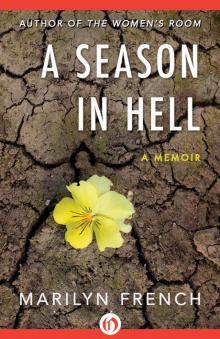 A Season in Hell
A Season in Hell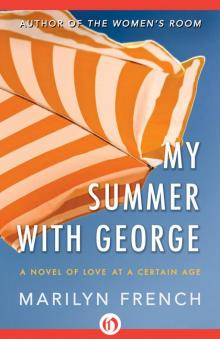 My Summer With George
My Summer With George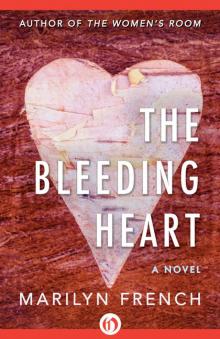 The Bleeding Heart
The Bleeding Heart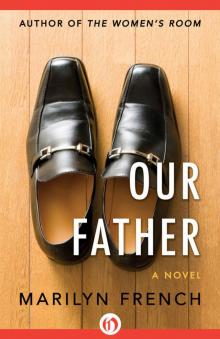 Our Father
Our Father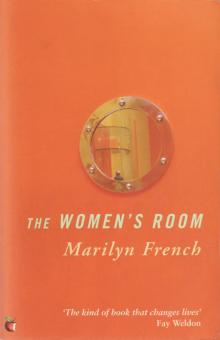 The Women's Room
The Women's Room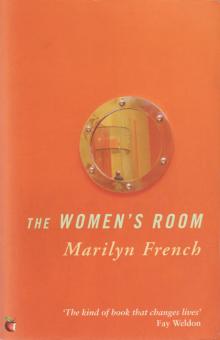 The Women's Room (Virago Modern Classics)
The Women's Room (Virago Modern Classics)